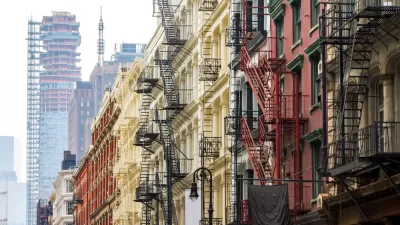Streetsblog NYC reviews new zoning and development rules proposed by the de Blasio Administration and finds incremental progress, not a major breakthrough, for parking policy.
Stephen Miller reports on the release of on a pair of proposals from New York City Hall last week, including a new Mandatory Inclusionary Housing program and a Zoning for Quality and Affordability Program [pdf]. Miller focuses on a key component of the latter—the reduction of parking requirements for residential development.
According to Miller, "[t]he de Blasio administration is proposing to reduce parking requirements near transit, but primarily for subsidized housing, not the market-rate construction the city expects to account for most new development."
As for the policy language that enacts the changes, Miller writes that "[p]erhaps the biggest change in the plan…is the creation of a 'transit zone' covering most land that allows new multi-family housing within a half-mile of a subway line." Miller adds more specifics: "Within the transit zone, off-street parking would not be required for new public housing, senior housing, or apartments reserved for people earning below a certain income. Buildings that include a mix of market-rate and subsidized housing could apply for a special permit to reduce or eliminate parking requirements on a case-by-case basis [PDF]."
Outside the transit zone, which, for the record, excludes lots of transit-adjacent neighborhoods, parking regulations remain largely the same.
It was a big week for planning in New York City. In addition to the Mandatory Inclusionary Housing program and the Zoning for Quality and Affordability Program, which will both now begin the official public review process, the Department of City Planning also released the East New York plan, which has already yielded a provocative editorial from Crain's New York Business.
FULL STORY: This Map Shows Where de Blasio Wants to Reduce Parking Mandates

Alabama: Trump Terminates Settlements for Black Communities Harmed By Raw Sewage
Trump deemed the landmark civil rights agreement “illegal DEI and environmental justice policy.”

Planetizen Federal Action Tracker
A weekly monitor of how Trump’s orders and actions are impacting planners and planning in America.

Why Should We Subsidize Public Transportation?
Many public transit agencies face financial stress due to rising costs, declining fare revenue, and declining subsidies. Transit advocates must provide a strong business case for increasing public transit funding.

Understanding Road Diets
An explainer from Momentum highlights the advantages of reducing vehicle lanes in favor of more bike, transit, and pedestrian infrastructure.

New California Law Regulates Warehouse Pollution
A new law tightens building and emissions regulations for large distribution warehouses to mitigate air pollution and traffic in surrounding communities.

Phoenix Announces Opening Date for Light Rail Extension
The South Central extension will connect South Phoenix to downtown and other major hubs starting on June 7.
Urban Design for Planners 1: Software Tools
This six-course series explores essential urban design concepts using open source software and equips planners with the tools they need to participate fully in the urban design process.
Planning for Universal Design
Learn the tools for implementing Universal Design in planning regulations.
Caltrans
Smith Gee Studio
Institute for Housing and Urban Development Studies (IHS)
City of Grandview
Harvard GSD Executive Education
Toledo-Lucas County Plan Commissions
Salt Lake City
NYU Wagner Graduate School of Public Service



























